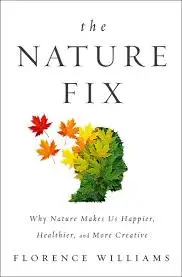
The Nature Fix
Why Nature Makes Us Happier, Healthier, and More Creative
Florence Williams
W.W. Norton (2017)
- Environmental
- Book, Premium Content, Resource Summary
Key Takeaways
- Dose–response: The more time you spend in natural settings, the greater the gains in mood, focus and immune health.
- Sensory reset: Natural sounds, sights and smells—birdsong, flowing water, tree oils—lower stress hormones and calm the nervous system.
- Micro-moments matter: Even short “green breaks” (a window view, a five-minute walk among trees) can ease fatigue and cognitive fog.
- Nature as therapy: Structured programs such as forest bathing, wilderness expeditions and garden projects improve PTSD symptoms and overall resilience.
Click to read full summary
The Essentials
Florence Williams travels from Japanese cedar forests to Finnish parks and Scottish woodlands to explore how nature heals body and mind. Using brain-wave monitors, heart-rate trackers and hormone assays, researchers demonstrate measurable drops in stress, sharper attention, and stronger immune defense after time outdoors. Williams argues that modern life—with its screens, noise and indoor confinement—starves us of sensory input humans evolved to need.
For people with Functional Neurological Disorder (FND), whose symptoms often flare under stress or sensory overload, these findings offer a practical, low-cost tool: purposeful time in calming natural environments. Whether it’s sitting beside a backyard tree or taking a weekend hike, nature can act as a gentle nervous-system regulator—no prescription required.
Why This Matters for FND
For individuals living with Functional Neurological Disorder, time in nature can serve as a gentle nervous-system reset. Calming, predictable outdoor stimuli—like rustling leaves or birdsong—help quiet the brain’s overactive threat response that often drives sensory overwhelm and fatigue. Regular exposure to green spaces also appears to raise levels of brain-derived neurotrophic factor (BDNF), a protein that supports neuroplasticity and underpins many rehabilitation strategies for FND. In other words, a consistent “dose” of nature not only soothes immediate stress but may also create the biological conditions that make long-term symptom improvement more achievable.
Resource Qualities
Applicability:
Accessibility:
Evidence-Based:
Practical Value:
Practical Applications
For Individuals with FND
Low-Energy Days
- Open a window, sit near a houseplant, play a 3-minute nature-sound track. Focus on one sense at a time (sight, sound or smell).
Building Long-Term Wellness
- Schedule a twice-weekly “green hour.” Track symptoms before and after to notice patterns of relief.
For Care Partners
Supporting Your Loved One
- Suggest a short co-walk in a quiet park or guide a brief “nature visualization” when outdoor access is limited.
Caring for Yourself
- Block 15 minutes outside—garden, stroll, or simply breathe fresh air—to reset your own stress levels and model balance.
When This is Most Helpful
- Newly diagnosed individuals seeking gentle, non-medical symptom regulators
- During periods of heightened stress, fatigue or sensory overload
- For care partners looking for shared, low-cost wellness activities
This summary is provided for informational purposes only and does not constitute medical, financial, or legal advice. It is not intended to replace professional consultation or treatment. Always consult qualified providers regarding your specific circumstances, symptoms, or questions.
